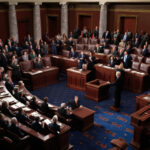In a significant development for the creative industry, over 11,500 artists, including renowned figures like Kevin Bacon, Thom Yorke, and Julianne Moore, have signed a petition against the unlicensed use of their intellectual property by artificial intelligence (AI) companies. This widespread discontent reflects a growing concern amongst creatives who feel their work is being exploited without appropriate compensation or acknowledgment.
The petition highlights a pressing issue: AI companies are using creative outputs—music, writing, visual art—without obtaining consent from the original creators. This practice, the artists argue, not only jeopardizes their livelihoods but also undermines the artistic process by commodifying art into mere “training data” for AI systems. Ed Newton-Rex, a British composer who organized the petition, articulated the sentiment that this approach is “dehumanising” to artists, who invest years of effort and passion into their works.
Among the signatories are creators from diverse fields, underscoring the widespread impact of this issue across the creative spectrum. Musicians, writers, and visual artists united in the belief that using their works for AI training without permission is an unjust encroachment on their rights. Their collective action represents a critical stand against the growing influence of AI in a domain historically rooted in human creativity and expression.
The implications of this protest extend beyond personal grievances; it also raises questions about the future of intellectual property rights in the digital age. As AI technologies continue to evolve, the distinction between creation and reproduction becomes increasingly blurred. The fear is that without proper regulation, artists may find their unique contributions diluted by a model that values quantity over quality.
In response to these concerns, the UK government is currently exploring new regulatory frameworks aimed at better protecting creative content in the digital landscape. One proposed solution is an “opt out” model, allowing artists to prevent AI companies from using their work without explicit consent. Such measures could empower creators, ensuring their rights are safeguarded while navigating the complexities of an AI-driven world.
The broader conversation surrounding AI and intellectual property rights is not only relevant to artists but also to businesses who rely on creative content for branding and marketing. Companies must take heed of the growing discontent as they consider incorporating AI technologies into their operations. Taking proactive steps to respect artists’ rights can establish brand integrity and foster trust within the creative community.
The petition’s impact could ripple through various industries as artists rally to protect their livelihoods. For instance, if artists’ rights are respected and established contracts are upheld, it could foster an ecosystem where both artists and technology companies benefit. Creative industries thrive on collaboration, and a mutual respect for intellectual property can pave the way for fruitful partnerships between creators and technology developers.
Moreover, AI’s potential to enhance the creative process should not be dismissed. When applied ethically, AI can be a powerful tool for artists, offering new avenues for expression and engagement. The challenge lies in finding a balance that respects the rights of creators while harnessing the innovative capabilities of technology.
Critics of the current AI practices argue that they threaten not just individual artists but the very fabric of creativity itself. They claim that by devaluing artistic works and treating them as mere data, AI jeopardizes the diverse cultural narratives that every piece of art contributes to. This protest reflects a desire not only for justice but for a sustainable future for creative expression.
In conclusion, the uprising of artists against AI’s unlicensed use of their work marks a pivotal moment in the ongoing discourse surrounding technology and creativity. As the UK government considers new regulations, it remains essential for all stakeholders involved to engage in an ongoing dialogue. The goal is to foster an environment where innovation and respect for artistic integrity coexist, benefiting both artists and the technological landscape that continues to evolve.












